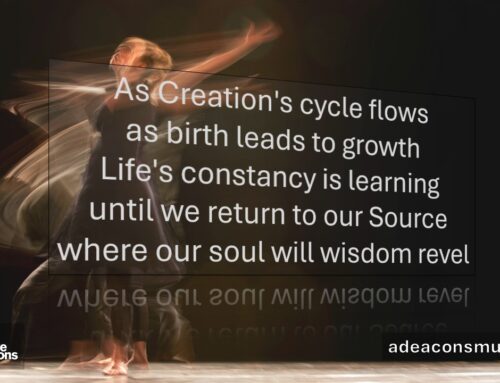These two words – Faith & Belief – have always been with me as I have journeyed along my path. How do they fit? Do they fit? Do they compete with one another? Are they complementary? Where do they reside in me?
This last week I have been able to do just one of the things that I find so very feeding in my ministry as a Deacon: I got to visit with no less than four Brothers and one Sister in the faith, who shared part of their stories and I, in turn, also shared a bit of my own. What is amazing in these places of trust, questions and most hopefully non-judgement is how deep people are willing to go, if given the opportunity to explore their journey as a Child of God.
Sometimes – though not always – these encounters are new for people. Sometime a person’s inner monologue may have glossed over some of the questions I ask – So where was God in that for you? Does it feel like you were alone? What does Jesus’ own ministry have to say to that experience? – but until given voice and life, it is easy to be distracted, to avoid those paths that might lead you down the rabbit hole …
One of the places we often arrive at in these conversations is what is Faith and what is Belief? At this point, I share what has been helpful for me and use my experience to frame where we might go next if there seems to be an impasse or a lack of language to proceed. For me, Faith resides in the body, whereas Belief is in the head. Sometimes there is another pause in the conversation and should it feel appropriate, I would share the following framework …
Faith is intrinsic to every person; it often defies articulation and is something that is simply known in one’s core. When words are applied to Faith or, perhaps more clearly, when one tries to translate Faith through words, it seems to me that poetry might be as close as one can come to transmit that truth. An experience that has been helpful me to describe this sense of Faith is the experience one has after diving a little too deep into the water of a cold, Canadian Shield lake. As one rises with kicking legs and pumping arms to the beckoning light just beyond the water’s edge, you know, you anticipate, your lungs are prepared to draw deeply of the fresh air for which your body longs. And as you break the barrier, there is a pause, your head suddenly warmer than the rest of your still submerged body, and then you draw in what you knew was there to replenish, purify and cleanse your oxygen deprived being … Faith is the trust that drawing in that longed for breath is literally life-giving …
Faith – that intrinsic sense of the Other, something bigger, larger, and yet implying a deep interconnection that defies initial experience – often requires, in a human culture of words, the scientific-method, and the need to qualify and quantify, an explanation! Unfortunately, the human condition is often uncomfortable with ambiguity and, as such, Faith moves from the body into the head as an exercise to explain what that means: Belief. Belief and the systems that arise are simply the language, the coding, the matrix, the framework upon which a collective experience attempts to explain Faith.
Now I can already hear those Orthodox voices – right opinion/true thinking – that would and will reject this critique. Though that might be an interesting and intellectually stimulating conversation, the fact is that most people – especially those who are exploring the Christian experience/language for the first time – would and do not appreciate a nuance that feels more akin to judgement than exploration and dialogue.
This tension between Faith and Belief has become clearly evident since my last blog – A Deacon’s Musing: Christian by Culture or Christian by Choice. The video – Why I Hate Religion, But Love Jesus – which I used at the end and has now been viewed on YouTube millions of times, has proven challenging because of the poet’s use of ‘religious.’ What I understand by the poet’s use of ‘religious’ speaks to the institutionalised aspect that often occurs as Belief systems evolve. What happens in this development of a system is that the intrinsic aspect – Faith – must be superseded, in order to ensure the clarity espoused by the institutional expression. And it is this tension, when trust is present, in which I get to muck about. When Brothers and Sisters, who are trying to reclaim a sense of Jesus’ ministry in their lives, experience his words being mocked by the institutions that claim to speak on his behalf, it is here that a conversation about Faith and Belief has proven an interesting stepping point …








Your reflections are most welcome!